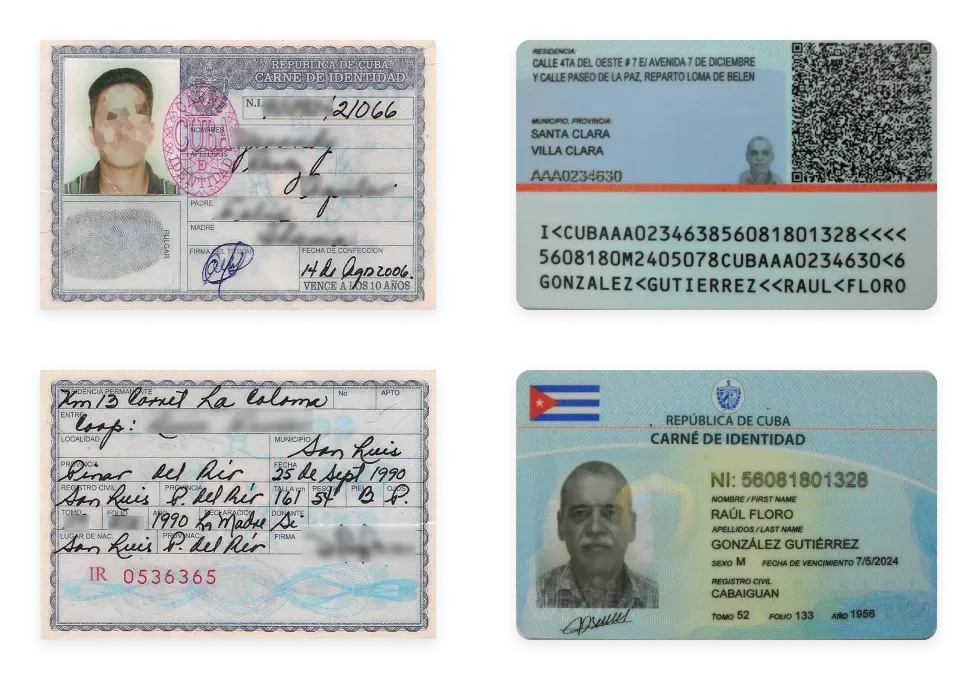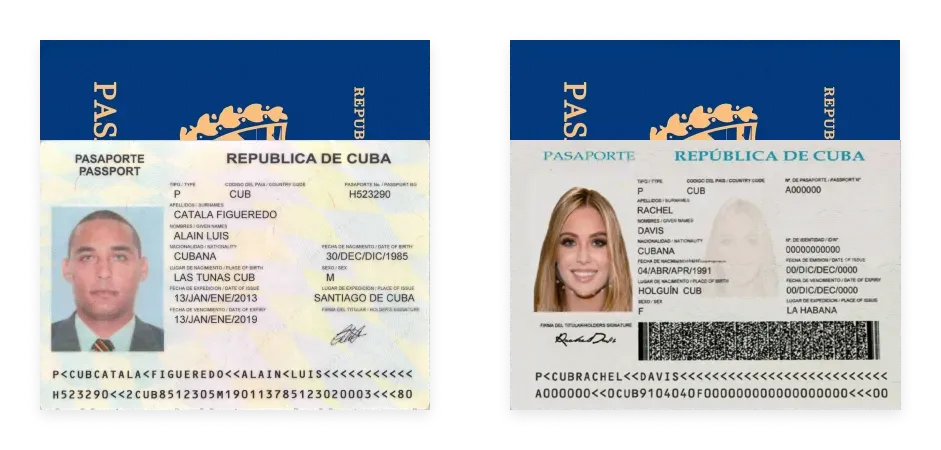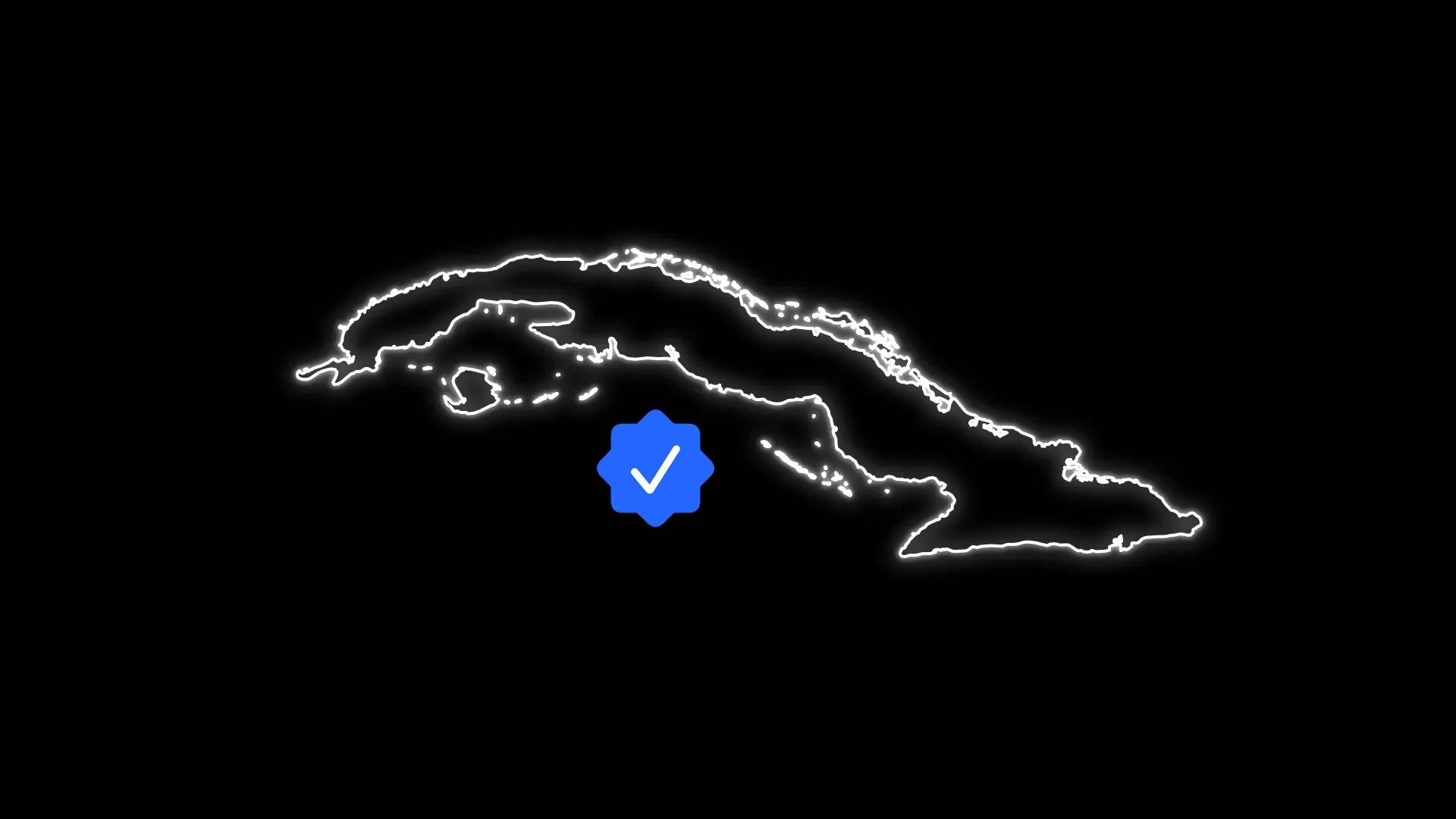Key takeaways
Cuba presents a complex identity verification ecosystem with strict KYC and AML regulations, where technology providers must adapt to limited infrastructure and constantly evolving regulatory frameworks.
Cuban identity documents (Identity Card, Passport, and Driver’s License) incorporate sophisticated security elements that require advanced technological solutions for precise verification.
Compliance in Cuba requires a specialized approach that combines artificial intelligence, deep regulatory knowledge, and the ability to adapt to a transforming financial system.
Identity verification in Cuba not only involves validating documents but also ensuring comprehensive compliance with regulations established by Decree-Law No. 317 and the resolutions of the Central Bank of Cuba.
Cuba emerges as a complex territory in the international compliance landscape. The Cuban financial system has undergone significant transformation in recent years, particularly in the field of preventing money laundering and financing terrorism.
According to the latest report from the Financial Action Task Force of Latin America (GAFILAT) in January 2024, Cuba has achieved substantial progress in its compliance regulatory framework. The country has improved its technical rating in crucial aspects such as financial risk assessment and the implementation of preventive measures against money laundering.
Statistics reveal an interesting scenario: Cuba has reduced identified risks in its financial system by 22% since 2020, implementing more robust identity verification and transaction control mechanisms. The Central Bank of Cuba has been fundamental in this process, modernizing its regulations to align with international KYC and AML standards.
The complexity of the Cuban system lies in its unique economic structure, where traditional regulations converge with new technological challenges. Identity verification thus becomes a critical process to maintain the integrity of the financial system, requiring institutions to implement solutions adapted to local Cuban regulations.

The Legal Framework of KYC and AML in Cuba: Regulatory Requirements
The Cuban financial compliance regulatory system represents a complex and constantly evolving legal ecosystem. The legal architecture to prevent money laundering and terrorism financing is structured mainly through three key regulatory instruments that define the standards of KYC and AML in Cuba.
Between 2020 and 2024, Cuba has experienced significant transformation in its regulatory framework. Resolutions 215/2021, 89/2022, and 76/2023 have incorporated new elements to address emerging challenges, particularly in the realm of digital assets and electronic transactions.
These modifications reflect Cuba's commitment to align with international compliance standards, responding to the recommendations of the Financial Action Task Force (FATF) and adapting to new global technological and financial realities.
The Cuban legal framework for KYC and AML is characterized by its complexity, technical rigor, and adaptability, establishing itself as a robust and constantly evolving regulatory system.
Decree-Law No. 317 of 2013: Main Regulatory Basis
Decree-Law No. 317, enacted on November 14, 2013, constitutes the backbone of the anti-money laundering system in Cuba. This legal instrument establishes a comprehensive framework that obligates all financial and non-financial institutions to implement rigorous mechanisms for identification and transaction monitoring.
The regulation defines with precision the procedures for the early detection of suspicious operations, establishing a detailed protocol that entities must follow. It introduces fundamental concepts such as customer due diligence, reporting unusual transactions, and criteria for identifying financial risks.
Decree No. 322 of 2013: Procedural Development
Complementing Decree-Law 317, Decree No. 322 delves into the procedural aspects of financial compliance. This decree specifically regulates the implementation mechanisms, defining precisely the processes of identity verification, record-keeping, and communication with regulatory authorities.
Resolution No. 51 of 2013 of the Central Bank of Cuba
Resolution No. 51 represents the technical concretization of the previous decrees. Issued by the Central Bank of Cuba, it establishes specific guidelines for financial institutions, defining precise standards for identity document verification and transaction monitoring.
This resolution introduces innovative elements like risk assessment by segments, the need for continuous updating of client profiles, and more sophisticated control mechanisms to detect potentially irregular operations.
Identity Verification in Cuba: A Challenge for Businesses
Identity verification in Cuba represents a technologically complex scenario that challenges traditional compliance and KYC processes. The limited digital infrastructure, combined with a heterogeneous documentation system, generates significant obstacles for businesses seeking to implement effective identification processes.
Restrictions on information exchange and the absence of a centralized repository of citizen data force the development of hybrid verification strategies. Businesses require advanced technological solutions that integrate document verification enhanced with artificial intelligence and biometric recognition to overcome the particularities of the local system.
The gradual digital transformation and recent resolutions from the Central Bank are creating new opportunities. The ability to adapt, deep regulatory knowledge, and technological flexibility become essential tools to navigate the complex compliance ecosystem in Cuba.
The Challenges of Document Verification in Cuba
Document verification in Cuba represents a unique scenario within the Latin American context of KYC and AML compliance. The complexity of the Cuban documentary system stems from a combination of historical, regulatory, and technological factors that can challenge traditional identity verification processes.
The Cuban documentation system is characterized by being in constant evolution. This leads to the coexistence of multiple versions of different documents. This documentary heterogeneity can pose challenges for many KYC providers.
Key Documents in Cuba: Identity Card, Passport, and Driver's License
Thus, the main documents used in verification in Cuba are three: the identity card, passport, and driver's license.
Cuban Identity Card
The Cuban Identity Card, known as CIC, is the fundamental identification document for local citizens. Issued by the Immigration and Identification Registry, this document becomes mandatory from the age of 16 and has a validity of 10 years. Its cost: 25 Cuban pesos (approximately 1€).
What are its features? It includes essential information about individuals, such as name, date of birth, unique identification number, and an updated photograph. The Identity Card is required daily for many everyday activities, like opening bank accounts, obtaining licenses, or participating in electoral processes.
In terms of security, the latest versions of the Cuban Identity Card incorporate a microchip with encoded biometric information. Additionally, the material on which it is printed includes special watermarks that make counterfeiting difficult.

Cuban Passport
The Cuban passport has undergone significant changes in recent times. Currently, it has a validity of 10 years for both residents in Cuba and Cubans abroad. Its cost varies significantly based on the location of issuance: around 180 euros in Europe, 180 dollars in the United States, and 2500 Cuban pesos on the island (approximately 100 euros at the exchange rate).
Regarding its security features, the passport incorporates an electronic chip that stores biometric information with 256-bit encryption algorithms. The inner pages of the document have complex designs with microprints almost imperceptible to the naked eye, so they can only be verified with specialized instruments.

Driver's License
The driver's license has become an additional identification tool, with renewal processes that include medical check updates. The verification of these documents requires special vigilance at present, as the Ministry of the Interior (Minint) extended the validity of expired permits between 2020 and 2023 until 2024.
Technological sophistication is the premise of the driver's license. It includes multiple security layers, including a dynamic hologram that changes color based on the viewing angle. Additionally, it includes microscopic text, only visible with high-precision equipment.

Didit: Transforming Identity Verification and KYC and AML Compliance in Cuba
Didit is revolutionizing the way compliance processes are carried out in Cuba. In a context where compliance is a critical challenge, Didit offers a free, unlimited, and forever identity verification (KYC) solution, adapted to the particularities of the Cuban market.
Thanks to this service, local businesses or those wishing to operate in Cuban territory can comply with regulations without significant expenditures. Indeed, the very regulatory landscape of Cuba demands specialized solutions in terms of KYC and AML, as we've seen in the latest resolutions from the Central Bank of Cuba or Decree Law No. 317.
What does our identity verification system include?
- Document Verification: We use artificial intelligence algorithms capable of validating the main Cuban identity documents, including the Identity Card, passport, and driver's license. Our system detects inconsistencies and extracts information with unprecedented precision, adapting to the complex Cuban documentary reality.
- Facial Recognition: We implement customized AI models that go beyond simple comparison. Our passive liveness test and advanced detection ensure that the person being identified is genuinely who they claim to be, overcoming the document fraud challenges characteristic of the Cuban market.
- AML Screening (optional): We perform real-time checks against global databases, including Cuba-specific watchlists. This process allows companies to comply with the requirements of Decree-Law No. 317 and the resolutions of the Central Bank of Cuba regarding the prevention of money laundering.
What Official Documentation Does Didit Verify in Cuba?
Our document verification service can work with the main Cuban documentation: we're talking about identity card, Cuban passport, and driver's license.
This means that businesses integrating Didit for identity verification in Cuban territory will achieve:
- Full compliance with local KYC and AML regulations: Didit's solutions are fully aligned with the Cuban regulatory framework, ensuring that businesses comply comprehensively with compliance requirements.
- Reduction of operational costs: By automating identity verification processes, Didit eliminates the need for costly manual reviews, allowing businesses to optimize resources and improve operational efficiency.
- Instant verification processes: Our artificial intelligence technology enables fast and accurate verification, enhancing user experience and significantly reducing onboarding times for businesses and clients.
Are you ready to revolutionize identity verification in Cuba? Our solution is not just a tool; it's a technological transformation tailored to your reality.

